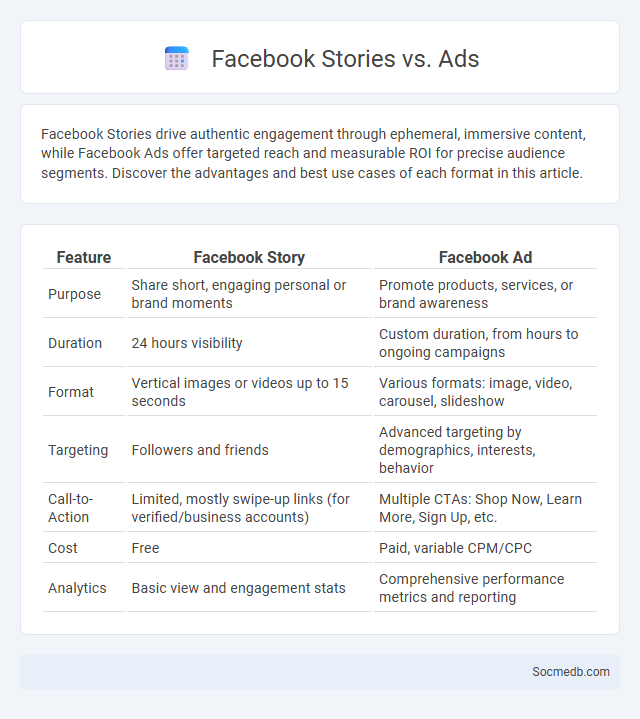
Photo illustration: Facebook Story vs Ad
Facebook Stories drive authentic engagement through ephemeral, immersive content, while Facebook Ads offer targeted reach and measurable ROI for precise audience segments. Discover the advantages and best use cases of each format in this article.
Table of Comparison
| Feature | Facebook Story | Facebook Ad |
|---|---|---|
| Purpose | Share short, engaging personal or brand moments | Promote products, services, or brand awareness |
| Duration | 24 hours visibility | Custom duration, from hours to ongoing campaigns |
| Format | Vertical images or videos up to 15 seconds | Various formats: image, video, carousel, slideshow |
| Targeting | Followers and friends | Advanced targeting by demographics, interests, behavior |
| Call-to-Action | Limited, mostly swipe-up links (for verified/business accounts) | Multiple CTAs: Shop Now, Learn More, Sign Up, etc. |
| Cost | Free | Paid, variable CPM/CPC |
| Analytics | Basic view and engagement stats | Comprehensive performance metrics and reporting |
Introduction: Understanding Facebook Story, Ad, and Story
Facebook Stories are short, ephemeral posts that disappear after 24 hours, designed to engage users with temporary, visually rich content. Ads integrated within Facebook Stories leverage this format to deliver immersive, full-screen marketing messages that blend seamlessly with organic stories, enhancing user interaction and brand recall. Understanding the distinct features and audience behavior toward Facebook Stories and Story Ads is crucial for optimizing social media marketing strategies and maximizing reach.
Defining Facebook Story: What It Is and How It Works
Facebook Story is a feature allowing users to share photos and videos that disappear after 24 hours, offering a more temporary and casual way to connect with friends and followers. This feature integrates seamlessly with the main Facebook feed and Messenger, providing interactive tools like stickers, text, and filters to enhance engagement. Facebook Stories utilize algorithm-driven visibility, appearing prominently at the top of the mobile app to encourage timely updates and real-time sharing.
What Are Facebook Ads? Key Features and Formats
Facebook Ads are targeted advertising campaigns designed to reach specific audiences based on demographics, interests, and behaviors on the Facebook platform. Key features include advanced audience targeting, budget control, detailed performance analytics, and various ad formats such as image ads, video ads, carousel ads, and collection ads. You can leverage these options to increase brand visibility, drive website traffic, and boost engagement effectively.
Exploring the Concept of “Story” Across Social Platforms
Stories on social media serve as dynamic, ephemeral content that engages audiences through real-time updates and visual narratives, enhancing personal and brand connections. Platforms like Instagram, Facebook, and Snapchat utilize stories to promote authenticity, encourage interaction, and boost visibility through features like polls, stickers, and swipe-up links. By leveraging these tools, your content can achieve higher engagement rates and foster a more intimate relationship with your audience.
Audience Reach: Facebook Story vs Ad vs Story
Facebook Stories offer fleeting, engaging content that captures immediate attention from your existing followers, increasing direct audience interaction. Facebook Ads enable targeted reach beyond your current audience by leveraging advanced demographic and interest-based filters, maximizing exposure and potential conversions. Focusing on Your marketing goals, combining Facebook Stories for authentic engagement with Ads for expansive reach optimizes overall audience growth and brand visibility.
Engagement and Interaction: Which Drives More Results?
Engagement and interaction on social media platforms significantly influence brand visibility, with interactive content generating up to 70% more user participation than passive posts. Metrics such as comments, shares, and direct messages foster deeper connections, increasing conversion rates by an average of 25%. Prioritizing authentic interaction over superficial engagement maximizes ROI and long-term audience loyalty.
Creative Flexibility: Design and Content Opportunities
Social media platforms offer unparalleled creative flexibility, allowing you to design visually compelling content tailored to diverse audiences. Features like customizable layouts, interactive stories, and multimedia integration enable the creation of engaging posts that capture attention and drive interaction. Leveraging these tools maximizes your brand's impact and fosters a dynamic connection with followers.
Cost and ROI Comparison: Organic Story vs Paid Ads
Organic social media stories generate engagement without direct costs but require significant time investment, making ROI dependent on brand loyalty and content quality. Paid ads on platforms like Facebook and Instagram involve clear expenditures but offer targeted reach and measurable conversions, often yielding higher immediate ROI. Businesses should analyze cost per acquisition and lifetime value to balance investment between these strategies.
Best Use Cases: When to Choose Each Format
Choosing the right social media format depends on your content objectives and audience engagement goals. Short videos excel for quick, captivating storytelling, Stories drive real-time interaction, and carousel posts effectively showcase products or multiple ideas visually. You can maximize reach and impact by aligning your format choice with your campaign's purpose and target demographic preferences.
Conclusion: Selecting the Right Strategy for Your Goals
Choosing the right social media strategy requires aligning platform features with your target audience's behavior and your business objectives. Data-driven insights and continuous performance analysis enable optimization of content delivery and advertising efforts. Prioritizing engagement metrics and brand consistency ultimately drives growth and enhances customer loyalty.
 socmedb.com
socmedb.com